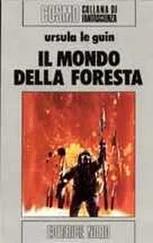Sour a Cetian and, like milk, he stayed sour. Mr. Or was being overbearing, and Commander Yung should shut him up. But could he? How did an “Emissary of the Council of the League of Worlds” rank? Who’s in charge here, thought Lyubov, and he too felt a qualm of fear. His headache had returned as a sense of constriction, a sort of tight headband over the temples.
He looked across the table at Lepennon’s white, long-fingered hands, lying left over right, quiet, on the bare polished wood of the table. The white skin was a defect to Lyubov’s Earth-formed aesthetic taste, but the serenity and strength of those hands pleased him very much. To the Hainish, he thought, civilization came naturally. They had been at it so long. They lived the social-intellectual life with the grace of a cat hunting in a garden, the certainty of a swallow following summer over the sea. They were experts. They never had to pose, to fake. They were what they were. Nobody seemed to fit the human skin so well. Except, perhaps, the little green men? The deviant, dwarfed, over-adapted, stagnated creechies, who were as absolutely, as honestly, as serenely what they were….
An officer, Benton, was asking Lepennon if he and Or were on this planet as observers for the (he hesitated) League of Worlds, or if they claimed any authority to … Lepennon took him up politely: “We are observers here, not empowered to command, only to report. You are still answerable only to your own government on Earth.”
Colonel Dongh said with relief, “Then nothing has essentially changed—”
“You forget the ansible,” Or interrupted. “I’ll instruct you in its operation, Colonel, as soon as this discussion is over. You can then consult with your Colonial Administration.”
“Since your problem here is rather urgent, and since Earth is now a League member and may have changed the Colonial Code somewhat during recent years, Mr. Or’s advice is both proper and timely. We should be very grateful to Mr. Or and Mr. Lepennon for their decision to give this Terran colony the ansible destined for Prestno. It was their decision; I can only applaud it. Now, one more decision remains to be made, and this one I have to make, using your judgment as my guide. If you feel the colony is in imminent peril of further and more massive attacks from the natives, I can keep my ship here for a week or two as a defense arsenal; I can also evacuate the women. No children yet, right?”
“No, sir,” said Gosse. “482 women, now.”
“Well, I have space for 380 passengers; we might crowd a hundred more in; the extra mass would add a year or so to the trip home, but it could be done. Unfortunately that’s all I can do. We must proceed to Prestno; your nearest neighbor, as you know, 1.8 lightyears distant. We’ll stop here on the way home to Terra, but that’s going to be three and a half more E-years at least. Can you stick it out?”
“Yes,” said the Colonel, and others echoed him. “We’ve had warning now and we won’t be caught napping again.”
“Equally,” said the Cetian, “can the native inhabitants stick it out for three and a half Earth-years more?”
“Yes,” said the Colonel. “No,” said Lyubov. He had been watching Davidson’s face, and a kind of panic had taken hold of him.
“Colonel?” said Lepennon, politely.
“We’ve been here four years now and the natives are flourishing. There’s room enough and to spare for all of us, as you can see the planet’s heavily underpopulated and the Administration wouldn’t have cleared it for colonization purposes if that hadn’t been as it is. As for if this entered anyone’s head, they won’t catch us off guard again, we were erroneously briefed concerning the nature of these natives, but we’re fully armed and able to defend ourselves, but we aren’t planning any reprisals. That is expressly forbidden in the Colonial Code, though I don’t know what new rules this new government may have added on, but we’ll just stick to our own as we have been doing and they definitely negative mass reprisals or genocide. We won’t be sending any messages for help out, after all a colony twenty-seven lightyears from home has come out expecting to be on its own and to in fact be completely self-sufficient, and I don’t see that the ICD really changes that, due to ship and men and material still have to travel at near lightspeed. We’ll just keep on shipping the lumber home, and look out for ourselves. The women are in no danger.”
“Mr. Lyubov?” said Lepennon.
“We’ve been here four years. I don’t know if the native human culture will survive four more. As for the total land ecology, I think Gosse will back me if I say that we’ve irrecoverably wrecked the native life-systems on one large island, have done great damage on this subcontinent Sornol, and if we go on logging at the present rate, may reduce the major habitable lands to desert within ten years. This isn’t the fault of the colony’s HQ or Forestry Bureau; they’ve simply been following a Development Plan drawn up on Earth without sufficient knowledge of the planet to be exploited, its life-systems, or its native human inhabitants.”
“Mr. Gosse?” said the polite voice.
“Well, Raj, you’re stretching things a bit. There’s no denying that Dump Island, which was overlogged in direct contravention to my recommendations, is a dead loss. If more than a certain percentage of the forest is cut over a certain area, then the fiberweed doesn’t reseed, you see, gentlemen, and the fiberweed root-system is the main soil-binder on clear land; without it the soil goes dusty and drifts off very fast under wind-erosion and the heavy rainfall. But I can’t agree that our basic directives are at fault, so long as they’re scrupulously followed. They were based on careful study of the planet. We’ve succeeded, here on Central, by following the Plan: erosion is minimal, and the cleared soil is highly arable. To log off a forest doesn’t, after all, mean to make a desert—except perhaps from the point of view of a squirrel. We can’t forecast precisely how the native forest life-systems will adapt to a new woodland-prairie-plowland ambiance foreseen in the Development Plan, but we know the chances are good for a large percentage of adaptation and survival.”
“That’s what the Bureau of Land Management said about Alaska during the First Famine,” said Lyubov. His throat had tightened so that his voice came out high and husky. He had counted on Gosse for support. “How many Sitka spruce have you seen in your lifetime, Gosse? Or snowy owl? or wolf? or Eskimo ? The survival percentage of native Alaskan species in habitat, after 15 years of the Development Program, was .3%. It’s now zero.—A forest ecology is a delicate one. If the forest perishes, its fauna may go with it. The Athshean word for world is also the word for forest . I submit, Commander Yung, that though the colony may not be in imminent danger, the planet is—”
“Captain Lyubov,” said the old Colonel, “such submissions are not properly submitted by staff specialist officers to officers of other branches of the service but should rest on the judgment of the senior officers of the Colony, and I cannot tolerate any further such attempts as this to give advice without previous clearance.”
Caught off guard by his own outburst, Lyubov apologized and tried to look calm. If only he didn’t lose his temper, if his voice didn’t go weak and husky, if he had poise….
The Colonel went on. “It appears to us that you made some serious erroneous judgments concerning the peacefulness and non-aggressiveness of the natives here, and because we counted on this specialist description of them as non-aggressive is why we left ourselves open to this terrible tragedy at Smith Camp, Captain Lyubov. So I think we have to wait until some other specialits in hilfs have had time to study them, because evidently your theories were basically erroneous to some extent.”
Читать дальше




